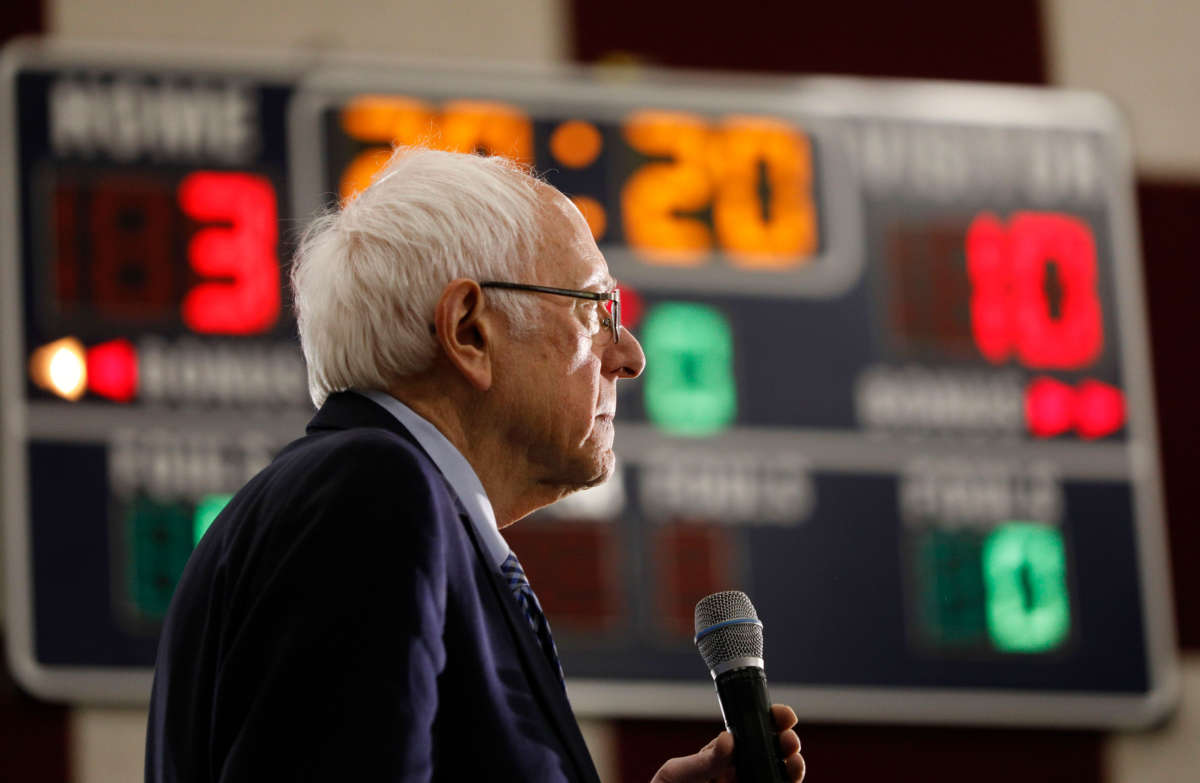Today’s primary elections in Michigan, Missouri, Mississippi, Idaho, North Dakota and Washington State represent a whole series of bellwether gut-checks for Bernie Sanders. If he fares poorly in Michigan, Idaho, Washington State and North Dakota in particular — four states he won handily in 2016 — he will have a difficult time justifying a continuation of his campaign.
The expanding coronavirus outbreak and stock market meltdown have cast a strange gloom over today’s vote. It may seem counterintuitive to think these events may do the Sanders campaign damage — both are vivid billboards advertising the need for immediate and radical change — but frightened people tend to shy away from bold steps. Joe Biden has been casting himself as the “safe” candidate from the beginning, and voters may choose the mirage he is offering over the revolution Sanders has promised. It is, at least, a concern the Sanders camp will face today.
Adding to Sanders’s concerns is the perilous possibility that turnout could be bleak because of the outbreak; turnout was Sanders’s biggest problem on Super Tuesday, particularly among younger voters. Washington State would be an exception, as it is a mail-in ballot state, so getting bodies to the polls is not a crucial issue there. Given how that state has been an epicenter during this outbreak, this feels like a small mercy for those folks. One less thing to worry about.
There are a number of new factors in play for these primaries beyond the black swan of coronavirus, the primary one being that they are all primaries now. Idaho and Washington State have ditched the caucus system and are holding primaries for the first time. In Idaho, it will be particularly interesting to watch how this new dynamic affects turnout, not to mention the final results. All the people who lacked the extra hours required to participate in a caucus now have the chance to vote on their lunch breaks.
More than anywhere else, all eyes will be on Michigan today. In 2016, Sanders’s shocking victory over Hillary Clinton in the primary there injected new life into his campaign after it was kicked around the block on that year’s Super Tuesday. Having endured an eerily similar setback this past Super Tuesday, and with his main opponent Joe Biden racking up endorsements left and right, Michigan has a must-win feel about it.
The Michigan polls do not bode well for Sanders. The latest Detroit Free Press/EPIC-MRA poll has Biden leading Sanders 51 percent to 27 percent. The latest Mitchell Research poll has Biden ahead 54 percent to 33 percent. The latest Monmouth poll has Biden ahead 51 percent to 36 percent.
Take this with as many grains of salt as you can scrounge; the polls showed Hillary Clinton with a similarly dominant lead on the eve of the 2016 Michigan primary, too. Still, these numbers are a worrisome sour note amid the larger coronavirus-driven chaos unfolding on primary day in Michigan.
Sanders held a rally in Ann Arbor on Sunday that drew an estimated crowd of 10,000 people, many of them younger voters. “We’re taking on Wall Street,” he told the assemblage. “We’re taking on the insurance companies. We’re taking on the drug companies. We’re taking on the fossil fuel industry. We’re taking on the military-industrial complex. We’re taking on the prison-industrial complex.”
“Michigan,” said Sanders to the Ann Arbor crowd, “is the most important state coming up on Tuesday.” Super Tuesday turnout among younger voters was a gruesome 13 percent, and without them, Sanders is finished as a presidential candidate. It’s fun to come to rallies and shout. If that energy is not translated at the ballot box, it is only sound and fury, signifying nothing.
Michigan and Washington State are the main contests to watch today. If Sanders loses Michigan, it will be a body blow to his campaign. If he loses Michigan and Washington State, the latter of which he won overwhelmingly in 2016, it could indicate that his coalition may have crumbled. If Biden runs the table today, the senator from Vermont will have a decision to make.
The opposite could just as easily be true, of course. Sanders could defy the Michigan polls as he did four years ago while also repeating his successes in Washington State, Idaho and North Dakota. With Trump and the GOP leaning hard into questions about Biden’s ability to endure a long general election campaign, a strong showing by Sanders today would seem to underscore the wisdom of remaining in the race. It’s still a long way to the convention in Milwaukee.
Media that fights fascism
Truthout is funded almost entirely by readers — that’s why we can speak truth to power and cut against the mainstream narrative. But independent journalists at Truthout face mounting political repression under Trump.
We rely on your support to survive McCarthyist censorship. Please make a tax-deductible one-time or monthly donation.
